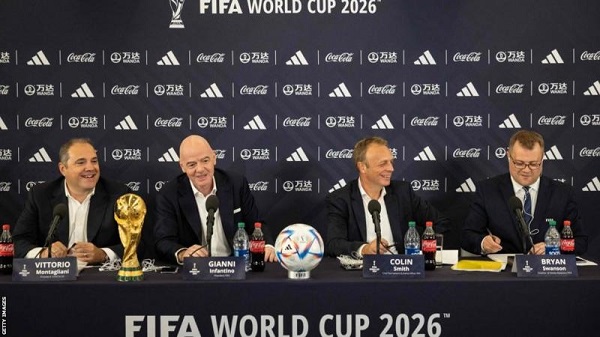A decision to switch the 2026 World Cup format back to four-team groups could be confirmed later this month.
The expanded 48-team competition in the United States, Mexico and Canada was due to feature 16 groups of three.
But the excitement generated by last year's tournament in Qatar, when some groups went down to tense final games, has caused FIFA to rethink.
Confirmation of the move could come at the governing body's council meeting in Rwanda on 16 March.
BBC Sport understands there is agreement among all parties that the four-team format should be retained, providing it does not extend the 'footprint' of the competition - which includes preparation time as well as the tournament itself.
"Groups of three sounded great but there are some issues," Concacaf president Victor Montagliani told the FT Business of Football Summit.
"Is it right that you qualify for a World Cup and a third of teams go home after two games?
"We do have to be responsible. There was a footprint of days for 2014 and 2018 and we can't go over that. We can't have a three-month World Cup."
Moving to groups of four would expand the competition from its projected 80 matches to a possible 104.
While the tournament would have to take place over a longer period, it is felt cutting preparation for teams - from nearly three weeks before Russia 2018, although not quite as drastically as the week they had before Qatar 2022 - would mean players were not on duty for a greater length of time.
The move is also bound to raise environmental concerns given more teams will have to travel and Montagliani says that issue is being taken seriously.
"The match schedule is very important," he said. "You can't have teams travelling from New York to Los Angeles.
"Teams will play in pods. There will be a group playing out of Boston, Philadelphia and New York. Another one in Vancouver and Seattle and another in LA and San Francisco.
"There are other strategies that have to be applied as well so we adhere to what is put in the bid."
Analysis - FIFA unable to balance environmental concerns with expansion goals
Dave Lockwood, BBC Sport head of editorial sustainability
This is a question of priorities for FIFA. Money v football v environment, and it seems very hard to find a way to satisfy all three.
The Qatar World Cup was proclaimed a triumph "on the pitch" despite it being heralded quite differently off it.
The four-team format worked fantastically and provided nail-biting final moments in those group stages.
To move to three-team groups is unthinkable to many football fans as it would affect the integrity of the tournament, and some reports even suggested penalty shootouts might be needed before kick-off.
But a move to four-team groups increases the footprint and emissions of the 2026 tournament significantly, potentially by as much as 25%.
Even with group games played in geographical 'pods', organisers' own projections are that, at 3.73 million tonnes CO2e, this was already due to be the most emitting World Cup ever when compared to Fifa's previously disclosed footprints, largely due to the huge geography involved.
CO2 equivalent, or CO2e, is the metric used to quantify the emissions from various greenhouse gases on the basis of their capacity to warm the atmosphere - their global warming potential.
It is worth noting too that the next tournament, in 2030, is likely to be a multi-country host and will face similar geographical challenges, so the precedent will increase the footprint for years to come as Fifa tries to halve the emissions of world football.
Fifa has largely created this dilemma for itself by expanding what was already the world's most popular sporting event, a move it is safe to assume was made with financial motivation - rather than concern for the environment - in mind, despite football's world governing body being, officially at least, a "not-for-profit" organisation.
BBC





